The sackings of Brett Ratten and Des Hasler this week highlight the pressure on coaches to deliver results. ROBERT CRADDOCK and PETER BADEL investigate the ultra-competitive worlds of the AFL and NRL.
Laurie Daley always knew coaching rugby league at State of Origin level had the potential to get under his skin … but not like this.
“In the third State of Origin match in the 2015 series we got hammered by Queensland (52-6) in the last game,’’ former NSW coach Daley recalled.
“Absolutely smashed. You know when you go back through things and you just feel awful.
“I broke out in a rash so I went to the doctor. I was diagnosed with shingles.
“Nothing else in my routine had changed. It had to be the coaching. They said it was just the pressure and stress of what I had been through. That’s what the game can do to you.’’
That and much more. Shingles and all, Daley was one of the lucky ones. A former playing great, he ended Queensland’s run of eight successive series wins but lost four of five series against the greatest Maroons dynasty of all time.
As great as the pressure was, Daley got out with his life after not being offered a new deal in 2017 and is now a well-entrenched breakfast host on Sydney’s Sky Sports Radio network as he contemplates a return to a less pressurised advisory role at Manly.

THE ULTRA-COMPETITIVE WORLD OF COACHING
In the ultra-competitive world of Australia’s major professional winter football codes the obsessive drive for a winning edge has created a blazing furnace of pressure which seems to grow hotter by the year.
In the AFL, two-time Geelong premiership winning coach Mark Thompson was found guilty of drug possession in 2019 after a police raid on his apartment in Melbourne discovered more than 400 ecstasy tablets.
Former Essendon coach James Hird admitted he contemplated suicide in the aftermath of a peptide scandal that engulfed the club on his watch.
In an entirely different issue, the AFL Coaches Association has been working overtime again in recent weeks dealing with shocking allegations against former Hawthorn head coach Alastair Clarkson and his then assistant Chris Fagan that they mistreated Indigenous players at the Hawks – claims the two coaches deny.
Both men have taken leave from their coaching positions (Clarkson at North Melbourne, Fagan at Brisbane) with their futures in the game resting on the outcome of a four-person panel investigating the accusations.
Rugby league was this year rocked by the suicide of former Queensland and North Queensland premiership coach Paul Green while, in the NRL, it’s been another brutal winter for the coaches with three – Nathan Brown (Warriors), Trent Barrett (Bulldogs) and Michael Maguire (Wests) – sacked with their tracksuits on midwinter. It brings the number of NRL coaches sent packing in the middle of a season to 40 since 1998.
Just this week Des Hasler joined their ranks when he was sent packing by Manly, while AFL club St Kilda followed suit in parting ways with Brett Ratten.

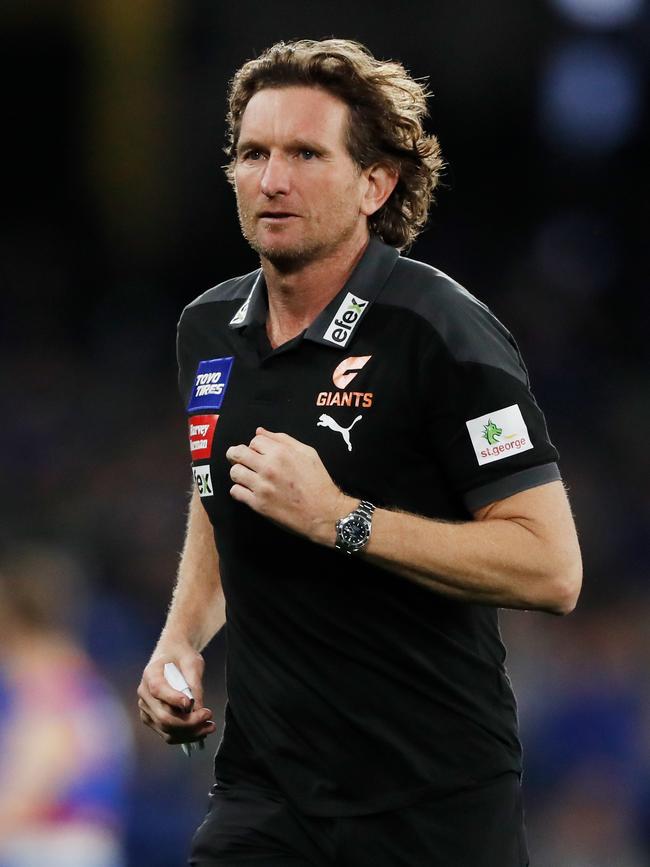
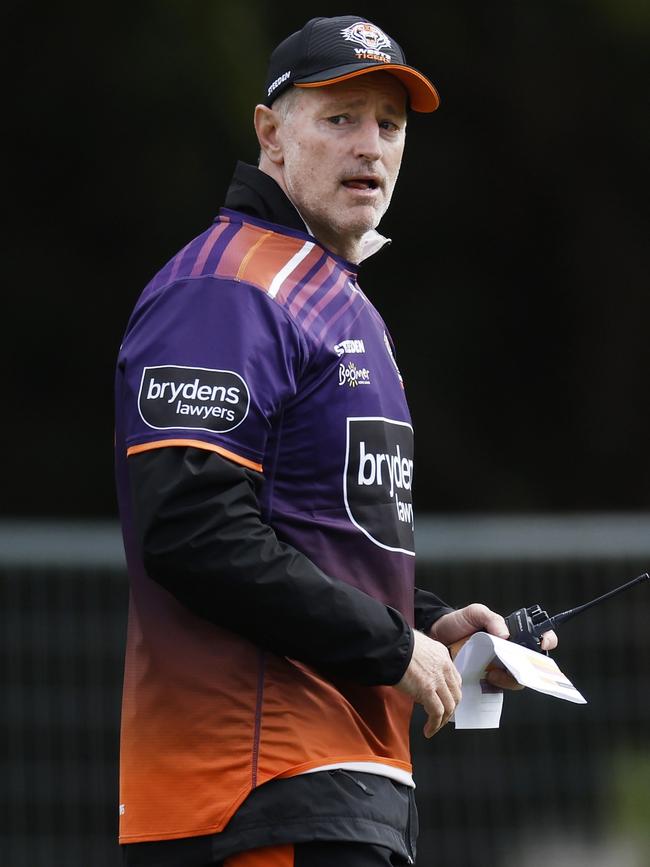
THE MASTER COACH’S REFLECTIONS
Amid the stormy waters which have engulfed the coaching scene there’s been one stone-faced sage who has stood, square-jawed and defiant, at the top level for 35 years – seven-time NRL premiership coach Wayne Bennett who will lead the competition’s new club, the Dolphins, into the NRL premiership next season.
Bennett has strident, passionate opinions about what qualities make a coach – and, more particularly, the red flags which signal “don’t try it”.
“If you want to coach, you’d better make sure you are emotionally stable,’’ Bennett said.
“Because if you are not, you will become unhinged. It’s just going to happen to you.
“That’s where the honesty part has to come in.
“I often say to people, coaching is great, but if you aren’t cut out for it, don’t do it, because it will destroy you.
“If you aren’t cut out for the pressure of it, it will send you to some dark places. The risk is you could turn to drugs or alcohol or the type of stuff where you try to find a release for the pressure you are going through every day.
“You have to have a lot of tough conversations with people and you have to have the gumption to make decisions knowing you may not be vindicated for months. And if you are vindicated, don’t expect anyone to ring you up and say, ‘Hey coach, you were right about that call’.’’
THE COACHES ASSOCIATION
The AFL, sensing the need for communal support, have had a coaches association since 2002. The NRL have been talking about one for just as long but never taken the plunge.
Finances (a rumoured $400,000 a year) have been an issue combined with the collective lack of focus of men more obsessed about the next week’s game than their life beyond their profession.
Roosters coach Trent Robinson, who hired Green as an assistant in 2013 in a move which helped snare that season’s premiership, said he first spoke to Green about forming a coaches association in 2016 but the plans are yet to leave the runway.
“It’s a wonderful job and we take with it the good and bad, we understand the role and that’s what makes it so wonderful,” Robinson said.
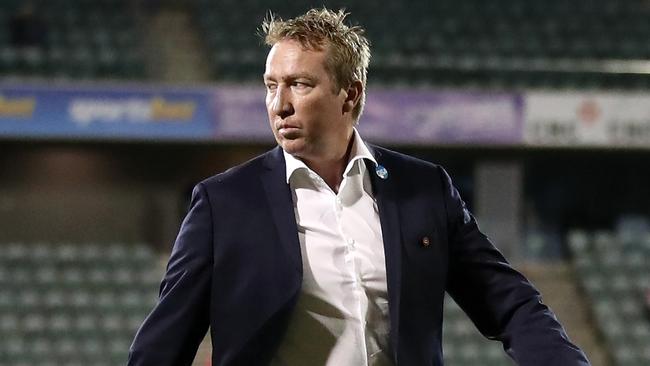
“We’ve got to understand sometimes that comes to an end. It doesn’t always continue for 16 (NRL) coaches, there are ones that go in and out.
“Greeny wasn’t coaching this year but he was a coach. That’s what he was. We know that and understood that. Knowing how to treat coaches that aren’t coaching at the moment needs to improve.’’
In a frank recent interview with News Corp, Socceroos coach Graham Arnold said of life beyond coaching, “The most natural drug there is – but it’s the worst drug in the world – is adrenaline. When you lose that rush that you’ve had in your body for years – and adulation you get when an elite athlete – it’s hard to deal with.
“In retirement, you can feel worthless. Some people can deal with it – some can’t. But it’s why a lot of (former) coaches … turn to a couple of things to keep that adrenaline going – cocaine, drugs, alcohol and gambling.’’
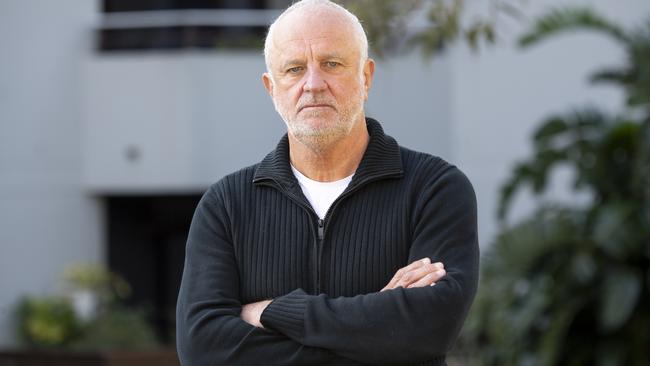
WHAT COMES NEXT AFTER COACHING?
Some former coaches melt into the vice route. Others simply find happiness in a quieter life and realise, as Bennett suggested, that they may not have been suited to the huge pressures of being the main man.
Former Queensland, Newcastle and Parramatta coach Michael Hagan, these days enjoying life as an assistant to Australian coach Mal Meninga and mentor to North Queensland’s Todd Payten, has a zest about him which vaporised during a brutal club stint at Parramatta. Hagan has always been regarded as well-grounded character but one morning in Sydney in 2008, his final year as a club coach, he couldn’t even find that ground with his feet. An ambulance was called as he suffered an extreme case of vertigo.
“I’ve been travelling from Newcastle to Sydney and back for two years and I was just exhausted,’’ said Hagan who resigned from the Eels role, partially for health reasons, at the end of that winter.
“I woke up and the room was spinning around. I thought I should get out of bed but I could not actually get my feet on the ground.
“They said I had vertigo. I haven’t had vertigo since that day and there’s something else I haven’t done … I haven’t lost my temper with people. Circumstances sort of pushed me to becoming a head coach. Now I am far more comfortable as an assistant. I am really enjoying life.’’
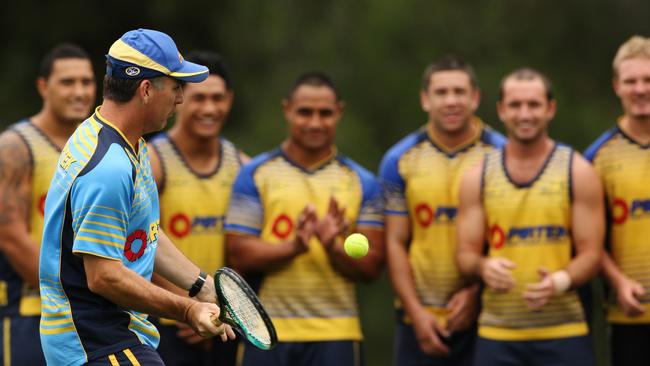
THE COACH WHO WAS SACKED AT HALFTIME
This year is the 25th anniversary of former Melbourne Demons AFL coach Neil Balme being effectively axed at halftime in a match against St Kilda at Waverley Park when his bottom of the ladder side trailed by 45 points.
Balme, 70, concedes with the benefit of hindsight his personality may not have been suited to the extreme demands of the job and he has since thrived in a role where his wisdom and experience have been valued at clubs like Geelong where he had a behind-the-scenes role in three premierships, Collingwood and Richmond.
“I don’t feel I was ideal for coaching because I didn’t feel I was quite mad enough,” Balme said.
“There is almost a level of madness involved about the coaching required – they have to drive players past beyond what they are capable of. I don’t agree with that. It’s very stressful.
“It’s a bit like being president of the United States. You can’t be normal and do it.
“But if I was advising a new coach I would say to them you don’t have to go mad. Stay sane. Build relationships and know what you have got to do.’’
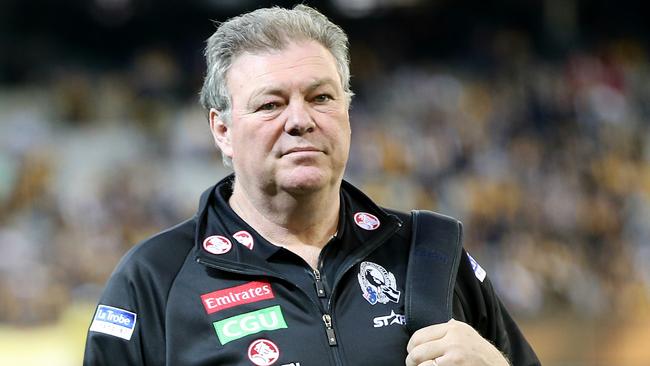
Then president of the Melbourne Football Club Joe Gutnick told Triple M’s Eddie McGuire in a radio interview at halftime in the Melbourne-St Kilda match that “heads would roll”, which everyone knew meant Balme was cooked.
“When the president goes on radio at halftime and tells everyone except you that you will be sacked it is not a lot of fun I can tell you,” Balme said.
“We in the rooms did not have any idea. They told us after the game. I was not greatly surprised because I was under pressure but it was a nasty, unpleasant thing to do.”
HOW SUPPORT FOR COACHES HAS CHANGED
Another axed coach Denis Pagan, who won two AFL titles with North Melbourne, reckons he “could write a book” about the brutal challenges of the under-siege coach after falling from grace at Carlton where he was dumped in 2007. Since leaving coaching Pagan started a real estate business and became a horse trainer who struck freakishly early success when he won the Group One Victoria Derby with Johnny Get Angry four months after saddling his first winner. At 74, his life is vibrant, stimulating and so busy it’s almost too busy but he well recalls the pain of his final, difficult years where he could feel the forces of change closing in from all directions.
“I remember when Carlton gave me the arse someone rang me from the coaches association and said, ‘You all right, son?’ and I said, ‘Yeah’, and that was that,” Pagan said.
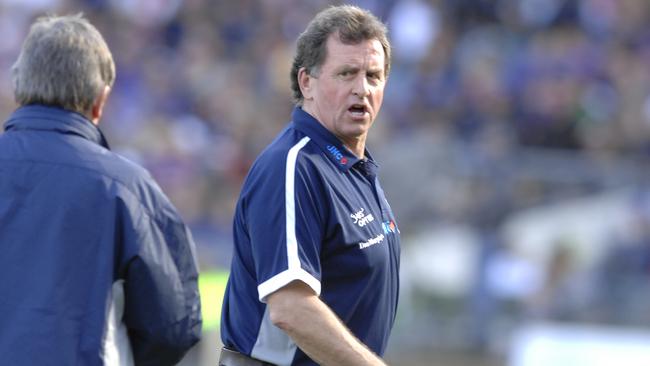
“It’s a better system now and it’s important that it is. I read about Paul Green’s death and spoke to my wife about it. When you finish up as a coach it can be a very humiliating experience. You can feel worthless.
“When you win, everyone wants to know you. When you lose it is fascinating to analyse the body language of people in your club who want to give you a wide berth. When I got the arse from Carlton I was disappointed because they virtually isolated my wife.
“(They) were initially very good to my wife but when I became a dead man walking I said to her, ‘Don’t come to the footy.’ You can become an island.
“I could write a book about it but it does not serve any purpose. You have to be strong and realise deep down there are only two sorts of coaches, those sacked and those waiting to be sacked. It will happen to you.
“With social media now you get criticised by people who would not know a football from an Easter egg.”
THE PRESSURE SOCIAL MEDIA BRINGS
Many modern coaches lament the suffocating pressures of social media but one man blissfully ignorant of them is Bennett who thinks Twitter is the sound the birds make in the morning on his Darling Downs farm.
“Social media is not good for your mental health which is why I’m not on it,” Bennett said.
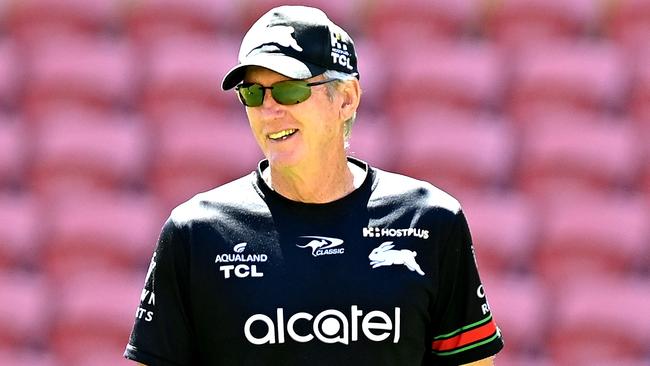
“I will respect someone telling me to my face what I’m doing wrong. But I couldn’t care less about some faceless keyboard warrior telling me what a shit guy I am and how I can’t coach.
“It’s out there. I can’t do anything about. So I ignore it.
“I don’t go anywhere near it. If you are a fan and you are into me for something, good luck, because I don’t even know where to find the criticism. If Allan Langer came to me and had some criticism, I would listen, because I know they know their stuff and they care enough to get me right,” he says.
“But the critics … they can’t break me.”
Just when you think modern football coaching is the mother of all pressure cookers Bennett has a contrary view that should make modern mentors appreciate that their pioneers may be the true heroes.
“Coaching now is a lot easier than it used to be. I don’t believe it’s more stressful now,” he said.
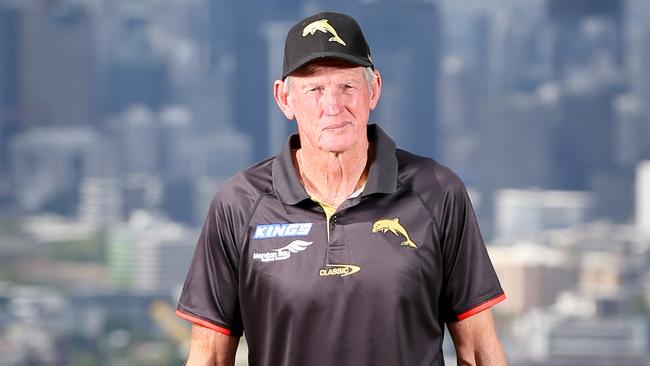
“I coached teams 40 years ago with no assistant, no staff, no money. I’m serious.
“I had a full-time job at the police academy and then I would have to go and coach. Now you get paid huge amounts of money, you have so many resources and assistants and you don’t have to worry about working another job.
“I got $2000 in my first year of coaching and I was coaching three teams. You had to do everything when I started out. You had to do your own scouting. I remember having to help build change rooms at Souths Brisbane and run raffles to raise money.
“They went broke when I was first coaching there and I barely got paid. That’s real pressure.
“In my eyes, coaching is comparatively a breeze these days.”
For the master maybe. Many other stressed-out mentors would love to feel that same breeze floating through their stressful lives.

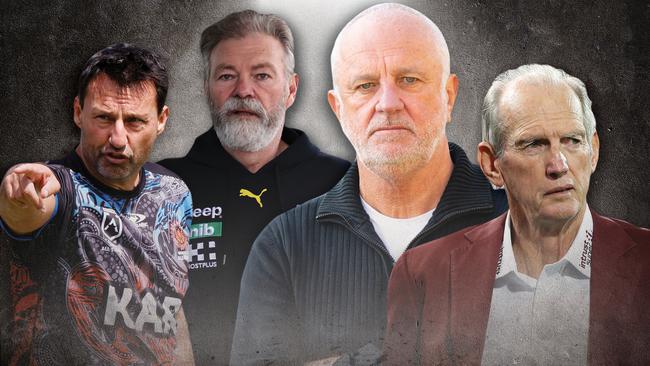
Add your comment to this story
To join the conversation, please log in. Don't have an account? Register
Join the conversation, you are commenting as Logout
Wild Bazball claim after record knock
An Indian star dropped a fierce reality check for England after Shubman Gill’s record-breaking knock tore the Poms to shreds.
The Hawk that’s ‘a pleasure to watch’ for Nathan Buckley
There’s a few things younger players can learn from this gun Hawk. Plus, which Bomber is set to fire when the penny drops? See Nathan Buckley’s full Super Saturday preview here.